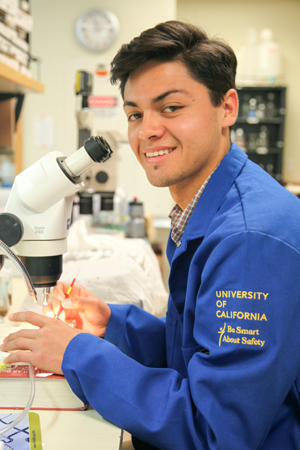In the evenings, after a day spent working on the grounds of Bethany University in Scotts Valley, Hector Navarro’s father would grab a quick dinner and head off to a second job doing small construction projects and home repairs.
Navarro would watch and think he’d never met a man who worked harder than his father. He’d think how proud he was of the way his dad had become a citizen and left the strawberry fields for a job that allowed his wife to raise their family of six — a simple but good life.
Navarro didn’t expect much more out of his own future. “I grew up thinking, ‘I come from humble roots so my life could quite possibly end up the same way,’” he says.
Then, Navarro found science.
Today, the 19-year-old Cowell College student is majoring in molecular, cell and developmental biology at UC Santa Cruz and is working in a genetics lab on campus with the goal of becoming a cancer researcher some day.
Navarro says even though his dad doesn’t completely understand the research he is doing on the mechanisms that drive cell division, his father is proud. “He always wears a UCSC sweatshirt,” Navarro says with a grin. “That’s so he can say: ‘Yeah, my son is a scientist there.’”
Navarro has dark hair, a quick smile, and a friendly manner. So it wasn’t unusual that he would ask questions when he discovered in high school that, not only was there a UC campus a few miles from his house, but also that a UC Santa Cruz professor of molecular, cell and developmental biology lived next door to a friend.
The answers Professor Bill Sullivan gave fascinated Navarro. Not understanding the university system, Navarro eagerly suggested to the geneticist that maybe he could “help out” at the lab when he was in college.
“He was just a really pleasant guy. I told him ‘sure,’” remembers Sullivan. “Like a lot of students, research is completely foreign to them.”
But Navarro didn’t forget the conversation and emailed Sullivan after his first year on campus. He applied for a position in Sullivan’s lab, interviewed, and won a spot.
Today Navarro, who plans to graduate in 2017, is helping work on research into the mechanisms that govern cell division, including those that are often associated with many types of cancers in humans.
“Hector has that maturity,” says Sullivan of Navarro’s work ethic in the lab. He described the undergraduate as responsible, sincere, and appreciative of the opportunities he has received.
“When you reach a certain age, you have to take a lot of factors into consideration when you choose a career,” Navarro says. “Income is one of the big ones. But I came from a really humble beginning so I don’t really care that much about being rich. I care more about doing something significant with my life.”
For him, that “something significant” is doing cancer research.
It was a decision encouraged by his mother, who always urged him to do something noble with his life. His professors at UC Santa Cruz were an influence as well, including Professor of Molecular, Cell and Developmental Biology Michael Rexach, who would often meet Navarro outside of class to share real stories about the scientific process and the characters involved — giving Navarro insight into the life of a researcher.
Navarro also credits Chancellor George Blumenthal and administrators for opening the door for people like himself.
“I think it’s really incredible how the university’s main goal is to give students like me these opportunities to be able to succeed,” Navarro says. “It’s not something I thought was possible. People from working-class families just don’t end up doing cancer research.”



